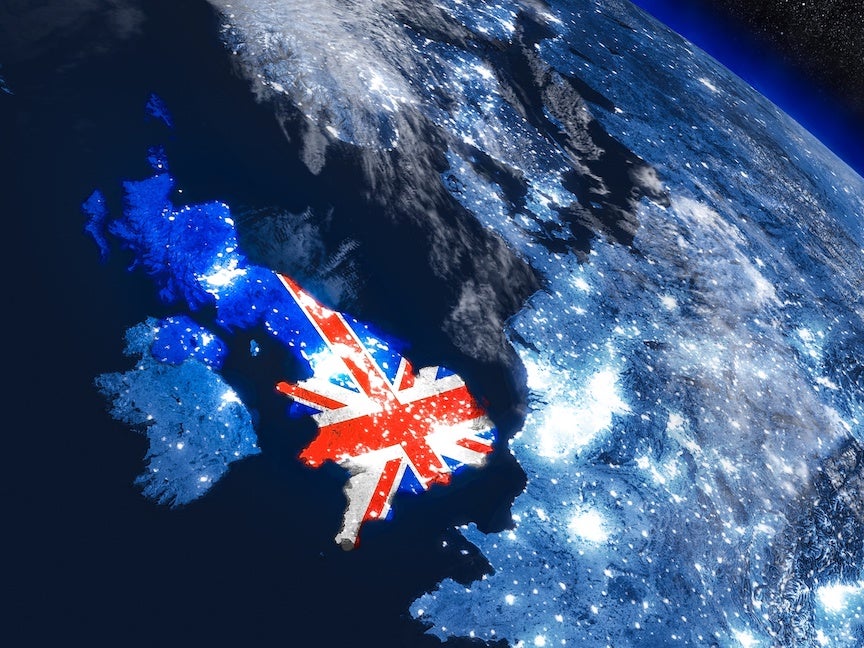Latest News

The United Kingdom unveiled its first-ever Defence Space Strategy (DSS) on Tuesday, with a commitment to invest 1.4 billion pounds ($1.95 billion) to boost national interests in space, including building a global surveillance satellite system.
UK Defence Procurement Minister, Jeremy Quin said in a Tuesday media event that such an approach is needed as the dynamics of space have changed.
“We know of the threat. Several states are pursuing hostile approaches when looking at space,” he said. “We rely on space to deliver global communications. Our new DSS strategy sets out a plan to become more resilient, more robust. We want the U.K. to be world-class space nation.”
Quin said investments in space and cyber are absolutely necessary. With potential threats coming from Russia and China, the U.K. wanted to part of a movement of keeping space safe and secure for all parties.
“Our absolute objective is to prevent a war in space,” he said. “We want to establish proper norms in space, similar to what we see at sea, for example. We are about the safe exploitation of space to the benefit of all. Part of that is the investments we are seeing today. We need to have space domain awareness.”
Chief of the Air Staff, Air Chief Marshal Sir Mike Wigston said the U.K. is determined to take a leading role with like-minded nations to develop a positive space environment.
“Space is fundamental to national security and our way of life. In defense terms, space gives us a unique competitive advantage. Space is an essential element to the multi-faceted domain we see today,” he said. “Space is far from a benign environment. In recent years, Russia and China have tested anti-satellite weapons. China wants to become the pre-eminent space power by 2045. We must understand what malign actors are doing in space.”
“You have to recognize some of the nefarious activities we are now seeing in space. This is not about weaponizing space, but protecting our national interest,” he added
The DSS has three strategic objectives. The first is the importance of protecting and defending the nation’s interests in space. The second is integrating space into defense operations as part of a multi-domain and multi-faceted approach. The third objective is to develop the U.K.’s cadre of space experts and equip future generations to face the threats of the future.
To that end, the U.K. is investing 1.4 billion pounds ($1.95 billion) into satellites and other technologies over the next decade. Part of the strategy is to invest 968 million pounds ($1.3 billion) to deliver a multi-satellite system to support greater global surveillance and intelligence for military operations – known as the Istari program. A further 61 million pounds ($81.92 million) will explore cutting-edge laser communications technology to deliver data from space to Earth at a speed equivalent to superfast broadband.
The U.K. government also announced that over the next four years, it will develop a network of satellites designed to integrate space with land, air, sea and cyber. An operational concept demonstrator, the new program, Minerva, will present the nation’s ability to autonomously collect, process and disseminate data from U.K. and allied space assets to support frontline military decision-making. Work has already commenced on the program and Minerva will present a developed and tested system, which will be brought together under the established UK Space Command and underpin the Istari program.
Another element is the Prometheus 21 program. Two tiny satellites, comparable to the size of a shoebox, built and designed by In-Space Missions will provide a test platform for monitoring through GPS, radio signals and sophisticated imaging, for a more connected space communication system with combat allies.
Natalie Moore, head of Space Policy for the Ministry of Defence said the DSS “sends a clear signal” that the U.K. MoD will be a big player in space. “This is about protecting and defending U.K. interests in space. We talk about integrated deterrents. I think we should be cautious about just talking about just space deterrents.”
Air Vice-Marshal Harv Smyth, director of Space for the MOD said the U.K. needs to deepen its ability to do space-based analysis, and echoed Moore’s comments about integrated deterrents. “One of the key takeaways is how multifaceted space is. A lot of the time a correct response to something happening in space may take place in another domain,” he said.
Air Vice-Marshal Paul Godfrey, commander of UK Space Command said there is potential for a greater relationship between the UK Space Command and the commercial satellite industry. “We want to hear how we can better integrate with the commercial industry. We want to bring the SMEs [small and mid-size enterprises] into the discussion. I think we can punch above our weight due to the caliber of people we have.”
For the UK government, it is another step to create toward the goal of being a leading space nation, following the first-ever national space strategy released last year.
“No one knows where we will be in 10 years’ time,” Quin said. “This is a significant industry we have here in the U.K. We are on this journey. We want to drive this innovation forward.”
Stay connected and get ahead with the leading source of industry intel!
Subscribe Now